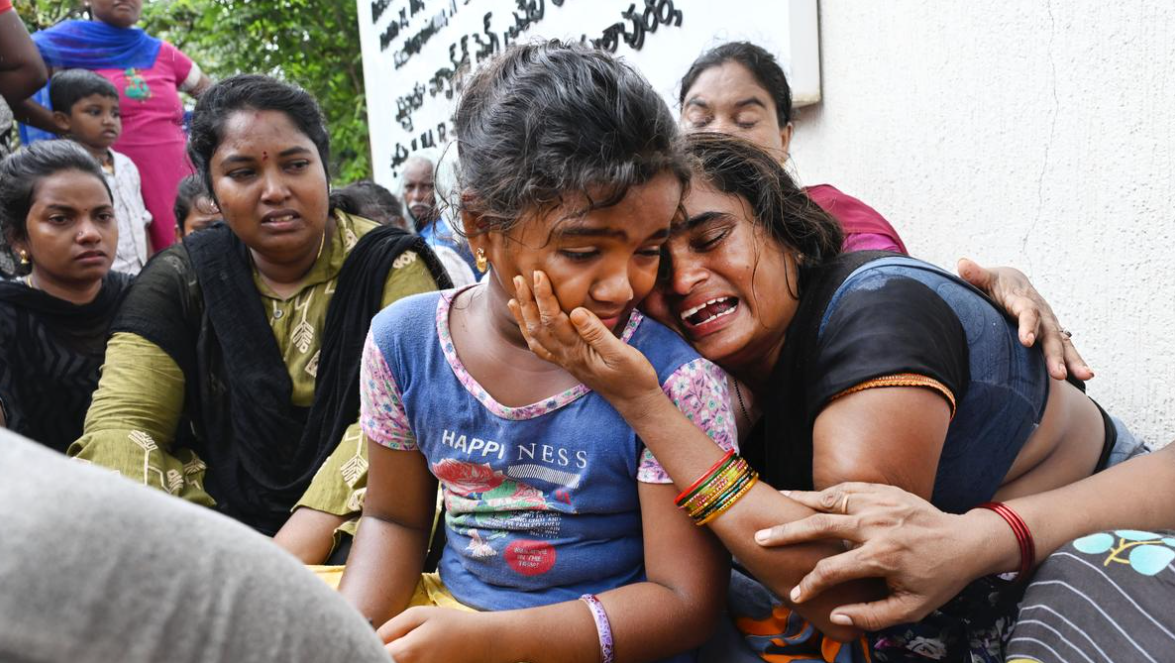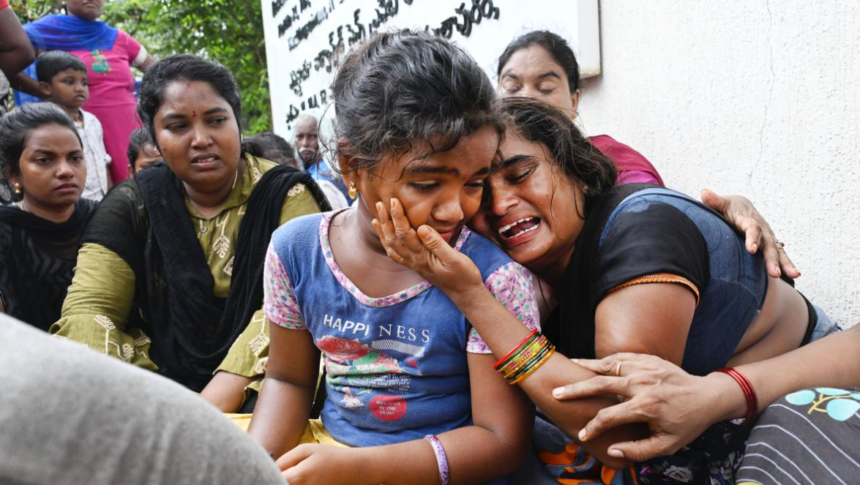In a Pharma Factory Fire devastating incident that has shaken the state of Andhra Pradesh, a massive fire broke out at a pharmaceutical factory, leading to the tragic loss of several lives and leaving many others severely injured. The incident has not only caused irreparable damage to the affected families but has also raised significant concerns about industrial safety standards and emergency preparedness in the region. In response to the tragedy, Chief Minister N. Chandrababu Naidu has announced an ex-gratia of ₹1 crore to the families of the deceased, alongside compensations for those who were injured in varying degrees. This announcement, while offering some financial relief to the victims, also underscores the gravity of the incident and the urgent need for reforms in industrial safety protocols.
The Incident Pharma Factory Fire: A Tragic Turn of Events
The Pharma Factory Fire in Andhra Pradesh broke out unexpectedly, quickly engulfing the premises and trapping several workers inside. The factory, which was engaged in the production of various pharmaceutical products, was operating with a full workforce at the time of the incident. Initial reports suggest that the fire was caused by a chemical reaction that spiraled out of control, leading to a series of explosions that further exacerbated the situation.
As the fire spread, emergency services were immediately alerted, but the intensity of the blaze made rescue operations extremely challenging. Firefighters and rescue teams worked tirelessly to control the fire and rescue those trapped inside, but the scale of the disaster meant that casualties were inevitable. By the time the fire was brought under control, several lives had been lost, and many others were left with severe injuries, some of which were life-threatening.
Government Response: CM Naidu’s Compensation Announcement
Pharma Factory Fire aftermath of the tragedy, Chief Minister N. Chandrababu Naidu visited the site of the incident and met with the families of the victims. Expressing his deep sorrow and condolences, CM Naidu announced a compensation package aimed at providing financial relief to the affected families. The package includes an ex-gratia payment of ₹1 crore to the families of those who lost their lives in the fire. Additionally, ₹50 lakh will be provided to those who were severely injured, while ₹25 lakh will be given to individuals who sustained minor injuries.
This announcement, while offering some solace to the grieving families, also reflects the government’s recognition of the severity of the incident and the need to support those who have been impacted by the tragedy. CM Naidu’s decision to provide such substantial compensation is indicative of the government’s commitment to ensuring that the victims and their families receive the necessary support during this difficult time.
Impact on the Families: The Human Cost of the Tragedy
The fire at the pharmaceutical factory has left a deep scar on the lives of the victims and their families. For those who lost loved ones, the tragedy has brought immense grief and a sense of irreparable loss. The ex-gratia payment of ₹1 crore, while significant, cannot compensate for the emotional and psychological impact of losing a family member in such a sudden and tragic manner.
For the injured, the road to recovery is likely to be long and challenging. The ₹50 lakh compensation for those who were severely injured will help cover medical expenses and rehabilitation costs, but the physical and emotional toll of the injuries will remain. Many of the injured workers may face long-term health issues, and their ability to return to work and lead normal lives could be severely compromised.
The ₹25 lakh compensation for those who suffered minor injuries will also provide much-needed financial support, but it is important to recognize that even minor injuries in such incidents can have lasting effects, both physically and mentally. The trauma of surviving a life-threatening incident and witnessing the loss of colleagues and friends can have a profound impact on an individual’s mental health, and this aspect must be addressed as part of the overall support provided to the victims.
Industrial Safety Concerns: A Wake-Up Call for Reforms
The Pharma Factory Fire has brought to the forefront the critical issue of industrial safety in Andhra Pradesh and across India. This tragic incident serves as a grim reminder of the potential hazards that exist in industrial operations, particularly in sectors like pharmaceuticals, where the handling of chemicals and other hazardous materials is a routine part of the work.
One of the key concerns raised by this incident is the adequacy of safety measures and protocols within the factory. Initial investigations suggest that the fire may have been triggered by a chemical reaction that went out of control, raising questions about whether the factory had sufficient safeguards in place to prevent such incidents. This includes the availability of safety equipment, proper training for workers in handling hazardous materials, and the presence of emergency response plans that could be quickly activated in the event of an incident.
The Pharma Factory Fire incident also highlights the need for stricter enforcement of safety regulations by government authorities. While India has a comprehensive set of laws and guidelines governing industrial safety, the enforcement of these regulations often falls short, leading to lapses that can have catastrophic consequences. There is a pressing need for regular safety audits, more stringent penalties for violations, and greater accountability for factory owners and managers to ensure that safety standards are not only met but exceeded. 
Emergency Response: Evaluating Preparedness and Effectiveness
Another critical aspect of the incident is the effectiveness of the emergency response. While emergency services were alerted quickly, the intensity of the fire and the subsequent explosions made rescue operations extremely difficult. The challenges faced by firefighters and rescue teams in controlling the blaze and reaching those trapped inside have raised questions about the preparedness of emergency services to handle such large-scale industrial disasters.
One Pharma Factory Fire of the key areas that need to be addressed is the availability and accessibility of firefighting equipment and resources. In many industrial areas, particularly those located in remote or less-developed regions, the lack of adequate firefighting infrastructure can severely hamper response efforts. This includes the availability of fire engines, water sources, and specialized equipment needed to deal with chemical fires.
There is also a need for better coordination between different agencies involved in emergency response. This includes not only firefighting and rescue teams but also local authorities, medical services, and law enforcement. Effective communication and coordination can significantly improve the speed and effectiveness of the response, potentially saving lives and minimizing damage.
Legal and Regulatory Implications: Accountability and Justice
Thee Pharma Factory Fire has also brought legal and regulatory issues to the forefront. There is a strong demand for accountability, with calls for a thorough investigation into the incident to determine the causes and hold those responsible accountable. This includes not only the management of the factory but also any government officials or agencies that may have failed in their duty to enforce safety regulations.
The investigation into the incident will need to consider several key factors, including whether the factory was in compliance with all relevant safety regulations, whether there were any lapses or violations, and what actions were taken by management and workers in response to the initial outbreak of the fire. If any negligence or misconduct is found, those responsible must be held accountable, and appropriate legal action must be taken.
There is also a need for regulatory reforms to prevent similar incidents in the future. This includes stricter enforcement of existing regulations, as well as the introduction of new guidelines and standards where necessary. The government must work closely with industry stakeholders, safety experts, and workers’ representatives to develop a comprehensive approach to industrial safety that prioritizes the protection of workers and the prevention of accidents.
Government’s Role: Providing Support and Driving Reforms
The Pharma Factory Fire government’s role in the aftermath of the incident goes beyond providing financial compensation to the victims and their families. While the ex-gratia payments announced by CM Naidu are an important step, there is a need for a broader response that addresses the root causes of the incident and ensures that such tragedies do not occur in the future.
Pharma Factory Fire includes providing ongoing support to the victims and their families, particularly those who have been severely injured and may require long-term medical care and rehabilitation. The government should work with healthcare providers to ensure that the injured receive the best possible care and that their recovery is supported in every way possible.
Pharma Factory Fire to immediate relief efforts, the government must also take the lead in driving reforms to improve industrial safety. This includes not only stricter enforcement of regulations but also initiatives to raise awareness and improve safety culture within industries. Training programs, safety audits, and incentives for compliance can all play a role in making industrial operations safer and reducing the risk of accidents.
Public and Media Reaction: A Demand for Change
The Pharma Factory Fire has sparked widespread outrage and concern among the public and the media. There is a strong demand for justice for the victims, as well as calls for systemic changes to prevent such incidents in the future. The incident has been widely covered in the media, with regular updates on the investigation and the government’s response.
Public opinion has been particularly critical of the perceived lapses in safety and the adequacy of the emergency response. There is a growing sense that more needs to be done to protect workers in industrial settings and that the government and industry must work together to address the underlying issues that contribute to such tragedies.
The media has played a crucial role in keeping the issue in the public eye, providing a platform for the voices of the victims’ families and advocating for change. This has helped to ensure that the incident is not forgotten and that the demand for accountability and reform remains strong.
The Road Ahead: Ensuring Safety and Preventing Future Tragedies
As the investigation into the pharmaceutical factory fire continues, it is clear that there are several key areas that need to be addressed to prevent similar incidents in the future. This includes improving industrial safety standards, strengthening emergency response capabilities, and ensuring that those responsible for the tragedy are held accountable.
The government’s response, including the compensation announced by CM Naidu, is an important step in providing immediate relief to the victims and their families. However, there is a need for a broader and more sustained effort to address the systemic issues that contribute to industrial accidents.
This includes not only regulatory reforms but also a cultural shift within industries towards prioritizing safety and risk management. By working together, the government, industry, and workers can create a safer environment that protects the lives and well-being of all those involved in industrial operations. The fire at the pharmaceutical factory in Andhra Pradesh is a tragic reminder of the importance of industrial safety and the need for vigilance in preventing accidents. While the compensation announced by CM Naidu offers some relief to the victims and their families, the incident has highlighted the urgent need for reforms and improvements in safety standards.
As the investigation continues and the government takes steps to address the issues raised by the incident, it is crucial that the lessons learned are applied to prevent future tragedies. The safety and well-being of workers must be a top priority, and all stakeholders must work together to ensure that such incidents are never repeated. ALSO READ:- Kolkata Doctor Rape-Murder Case: CBI Seeks Polygraph Test on Ex-Principal Sandip Ghosh 2024





